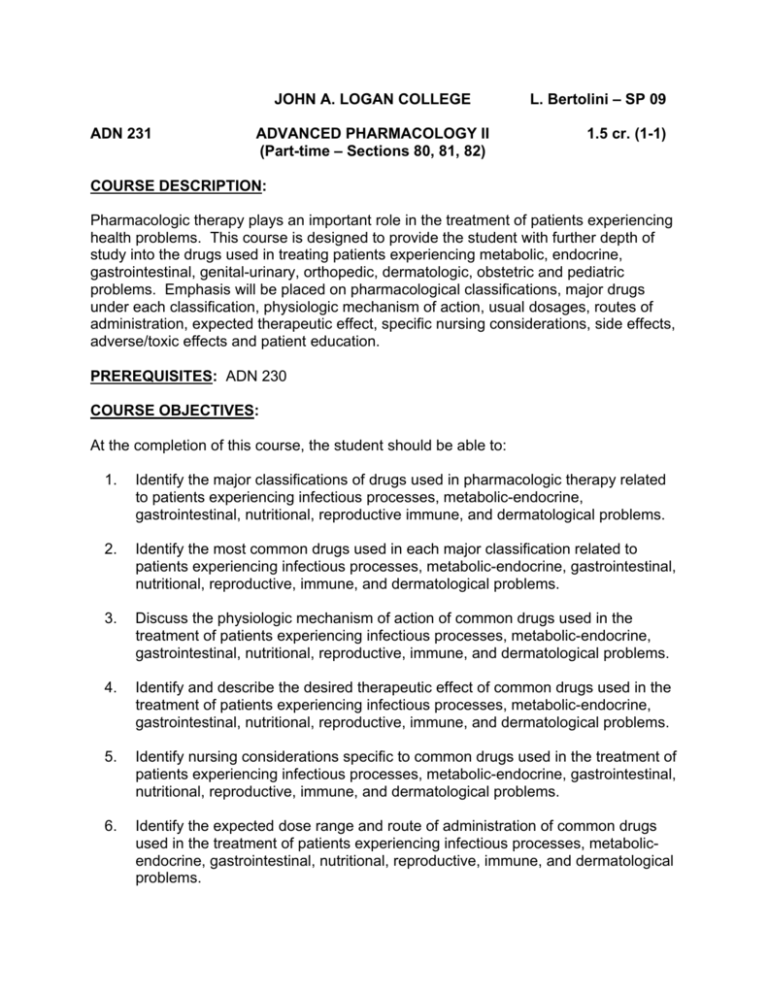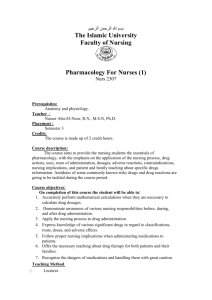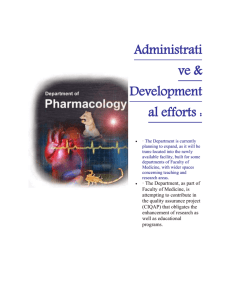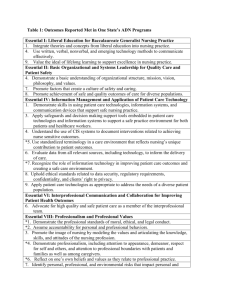ADN 231 PT Bertolini 12-19-08-1d SP 09
advertisement

JOHN A. LOGAN COLLEGE ADN 231 ADVANCED PHARMACOLOGY II (Part-time – Sections 80, 81, 82) L. Bertolini – SP 09 1.5 cr. (1-1) COURSE DESCRIPTION: Pharmacologic therapy plays an important role in the treatment of patients experiencing health problems. This course is designed to provide the student with further depth of study into the drugs used in treating patients experiencing metabolic, endocrine, gastrointestinal, genital-urinary, orthopedic, dermatologic, obstetric and pediatric problems. Emphasis will be placed on pharmacological classifications, major drugs under each classification, physiologic mechanism of action, usual dosages, routes of administration, expected therapeutic effect, specific nursing considerations, side effects, adverse/toxic effects and patient education. PREREQUISITES: ADN 230 COURSE OBJECTIVES: At the completion of this course, the student should be able to: 1. Identify the major classifications of drugs used in pharmacologic therapy related to patients experiencing infectious processes, metabolic-endocrine, gastrointestinal, nutritional, reproductive immune, and dermatological problems. 2. Identify the most common drugs used in each major classification related to patients experiencing infectious processes, metabolic-endocrine, gastrointestinal, nutritional, reproductive, immune, and dermatological problems. 3. Discuss the physiologic mechanism of action of common drugs used in the treatment of patients experiencing infectious processes, metabolic-endocrine, gastrointestinal, nutritional, reproductive, immune, and dermatological problems. 4. Identify and describe the desired therapeutic effect of common drugs used in the treatment of patients experiencing infectious processes, metabolic-endocrine, gastrointestinal, nutritional, reproductive, immune, and dermatological problems. 5. Identify nursing considerations specific to common drugs used in the treatment of patients experiencing infectious processes, metabolic-endocrine, gastrointestinal, nutritional, reproductive, immune, and dermatological problems. 6. Identify the expected dose range and route of administration of common drugs used in the treatment of patients experiencing infectious processes, metabolicendocrine, gastrointestinal, nutritional, reproductive, immune, and dermatological problems. 2 7. Identify contraindications of common drugs used in the treatment of patients experiencing infectious processes, metabolic-endocrine, gastrointestinal, nutritional, reproductive, immune, and dermatological problems. 8. Discuss expected side effects and/or adverse effects of common drugs used in the treatment of patients experiencing infectious processes, metabolic-endocrine, gastrointestinal, nutritional, reproductive, immune, and dermatological problems. 9. Identify important patient education needed in administering common drugs used in the treatment of patients experiencing infectious processes, metabolicendocrine, gastrointestinal, nutritional, reproductive, immune, and dermatological problems. 10. Demonstrate accuracy in the calculation of drug dosage IV drip delivery rates and infusion rates of IV push drugs in the treatment of patients experiencing infectious processes, metabolic-endocrine, gastrointestinal, nutritional, reproductive, immune, and dermatological problems. 11. Identify major incompatibilities of IV drugs in the treatment of patients experiencing infectious processes, metabolic-endocrine, gastrointestinal, nutritional, reproductive, immune, and dermatological problems. 12. Describe the safe and accurate administration of blood transfusions. 13. Describe the safe and accurate administration of hyperalimentation and other nutritive products. 14. Compare and contrast various central intravenous catheters. 15. Identify relevant federal and state regulations related to medication administration, including the Nurse Practice Act. 3 COURSE OUTLINE: Part-Time – Sections 80, 81, 82 Date Chapters January 14 Chapter 28: Medications used to treat Hematopoietic Disorders Chapters 43, 44: Medications used to treat Endocrine Disorders Due Date: First attempt for Online Pharmacology Practice test A January 28 Chapters 43, 44, 45, 46: Medications used to treat Endocrine Disorders February 11 Chapters 30, 31: Medications used to treat GU and Metabolic Disorders February 25 Chapters 40, 41, 42: Medications used to treat GI Disorders March 18 Exam I covering all class handouts, lectures, PowerPoint slides and Chapters 28, 30, 31, 40, 41, 42, 43, 44, 45, 46 Due Date: First attempt for Online Pharmacology Practice test B April 1 Chapters 32, 33, 34, 35, 36: Medications used to treat Infections April 15 April 29 Chapters 32, 33, 34, 35, 36: Medications used to treat Infections Chapter 37: Medications used to treat Neoplasms Chapter 47, 48, 49: Medications used to treat Bone and Joint Disorders Medications used to treat Skin Disorders ATI Online Practice exams A & B deadline for achieving scores of 90% to be completed by April 27 COURSE REQUIREMENTS: A. Theory Requirements a. Exams b. Videos c. Student Participation d. ATI Pharmacology Online Practice tests with score at a 90% by April 27th e. NCLEX-RN review questions done weekly f. ATI NCLEX-RN Pharmacology Comprehensive Predictor Exam with composite score at a “Level 2” or above Assessment Technologies Institute (ATI) Pharmacology Testing – Students are required to take the ATI Pharmacology Online Practice Tests A & B as diagnostic indicators of their baseline knowledge in pharmacology. These tests will identify strengths and weaknesses which can be used in assisting them to develop an educational plan for this class to maximize their understanding of pharmacological therapies. Class time will not be allotted for these practice tests; they must be taken on the student’s own time. Due dates for the first attempt at these online practice tests are noted in the Course Outline. All students are required to achieve a minimum score of 90% on each of these practice tests by April 27. Students may retake these online pretests as often as necessary until they reach that benchmark. 4 Students will be given the ATI Pharmacology RN proctored Exam A at the conclusion of ADN 231 Pharmacology II. Students will be required to make a score at or above a “Level 2” on this secure exam in order to receive a passing grade in ADN 231. Students who do not make the minimum composite score at a “Level 2” will receive an Incomplete for ADN 231. The student should review their scores carefully and do the recommended remediation. Students requiring a retake will be allowed one (1) more opportunity to pass the ATI Pharmacology RN proctored Exam B. The retake may be done one week after the Exam A. But retakes must be completed no later than the first Monday after the last day of finals of the next semester. If the student does not make a composite score at a “Level 2” on the Exam B, then they will receive a failing grade (E) for ADN 231. Required NCLEX-RN questions. The course textbook has an accompanying instructional CD that contains chapter specific supplemental resources to assist students in learning the material. Included in this supplemental disc are drug dosage questions, drug review, drug classification review, case studies, care plans, glossary and pronunciation guide. Students are strongly encouraged to use these supplemental resources throughout the semester. Each chapter also includes 10 NCLEX-RN questions. Students are required to complete these questions and e-mail their results to the instructor prior to class. All NCLEX-RN responses must be sent to the following address: pharm@whitleyworld.com via the web access set up on the text CD. Use only this e-mail address for submitting questions. Completion of the questions prior to class is a course requirement. No Cellular Phones. Turn off all cell phones before entering the classroom or lab. If you are in an employment situation that requires emergency contact, please put your phone on vibration mode. The ringing of phones, especially those with musical tones, is disruptive to the class. If your phone rings, leave the classroom or laboratory until the next break. Class Attendance. Students are expected to attend all classes. Students who are absent for 2 or more consecutive Pharmacology classes or miss 3 or more classes throughout the semester will be considered not attending and receive a failing grade for ADN 231. Students who are absent from class will be required to make up class with computer time in the area of pharmacology. A list of approved computer make-up programs and assignments will be provided by the instructor. Two (2) make-up hours will be required for each one (1) hour of class time missed. 5 Blackboard and ATI Website. Students are required to register on the Blackboard and ERI website as supplements to this course. It is best to use Internet Explorer 6 for Blackboard. Blackboard www.jalc.edu Select: Distance Learning Select: Blackboard Select: Blackboard Login Logon Select: Courses Select: Course Catalog Select: Nursing Select: ADN Advanced Pharmacology II Select: Enroll PowerPoint slides will be available to you on the Blackboard website. Students are not to print PowerPoint handouts on the ADN Lab (G211) printer or in the Career Assistance Lab (room 238). Students are to print their material either from their personal printer or use the printers located in the JALC Library. To sign up for ATI testing: Go to www.atitesting.com Select: Create a new account Follow all prompts to create a username and password RECORD your user ID number as you will be required to have this for all ATI testing Professional Behavior. Students are expected to conduct themselves in a professional manner that is conducive to a learning environment in the classroom and lab setting. Students who are perceived as disruptive or interfering with the educational process in any way will be required to leave the classroom. A meeting with the Director of Nursing will be required before the student is allowed to return to the classroom. The use of laptop computers in class for note taking is acceptable. However, the use of laptop computers for activities other than those related strictly to in-class content will not be tolerated. Students who use their computers for non-class related activities during class time will be prohibited from using their computers in this and other ADN classes. All PowerPoint material, tests handouts, pictures, instructional (written and computerized) materials including Blackboard notes are copyright protected and are the property of the instructor and John A. Logan College and are forbidden to be sold or copied for other students. Violation will result in removal from the program and/or possible legal repercussions. 6 All patient data is sensitive and falls under the federal law titled HIPAA (Health Insurance Portability and Accountability Act). Therefore, ALL patient data including beginning shift/clinical reports in clinical agencies, lab reports, process notes and recordings, care plans must be destroyed by shredding and may not be in possession of a student after the class/clinical. Violation may result in failing the class/clinical and may include removal from the nursing program for one year. B. Lab Requirements A concurrent lab experience is required. These labs will provide an opportunity to integrate theory with practice and refine psychomotor skills. Topics will include, but not be limited to, the following: central line IV management and total parenteral nutrition, blood product administration. There are no make-ups for missed labs. Labs will be held in G211 on: Part-Time Jan. 22 8-4 p.m. Jan. 29 8-4 p.m. Student Success Center. Tutors may be obtained through the Student Success Center. Contact the staff in C219 if this service is desired. John A. Logan College will make reasonable accommodations for students with documented disabilities under Section 504 of the Rehabilitation Act of 1973, and the Americans with Disabilities Act of 1990. Any student with a disability that may have some impact on work in this class, who feels she/he needs an accommodation, should make an appointment with the Coordinator of Services for Students with Disabilities on campus, Jennifer Frost, Room C219B, Ext. 8516. Before services can be provided, this advisor must determine eligibility and arrange appropriate academic adjustments. It is the student=s responsibility to register in advance of a school term with this office and to turn in a schedule each term to ensure that there is every opportunity for success in this class. English Writing Center/Tutoring. For assistance with writing assignments in any college course, students are encouraged to visit “The Write Place” in Room E109. English instructors are available for one-on-one tutoring each semester during hours posted at the center. Financial Aid. Students who receive financial assistance and completely withdraw from classes prior to 60% of the semester being completed (approximately 2-3 weeks after midterm) could be responsible to return a portion of their Federal Pell Grant award. Prior to withdrawing from courses, students should contact the Financial Aid Office. Course Withdrawal Information. It is expected that you will attend this class regularly. If you stop attending for any reason, you should contact your advisor and withdraw officially to avoid the posting of a failing grade (an E) to your transcript. It is also advisable to discuss the situation with your instructor before dropping. 7 METHOD OF EVALUATION: Exams, Case Studies, Class and Lab Participation, Lab Assignments ADN 231 Pharmacology II is a Pass/Fail class. There will be two exams. Students must receive a minimum of 75% on each exam in order to pass. Students who make less than 75% on an exam may retake an exam 2 additional times. The retake exams will cover the same material and will be offered in the Learning Lab. Retaken exams will not be subject to a grade adjustment (curve) and a deadline will be established for the retakes. Failure to make an 80% by the established deadline will result in a failure for ADN 230. No “Incompletes” will be issued under these circumstances. Students who wish to retake an exam will be required to review and sign a contract outlining the responsibilities of the student and instructor. Incompletes “Incompletes” will only be issued in the following circumstances: 1. In case of a medical or family emergency. 2. Pending successful completion of the ATI Pharmacology RN secure post exam per the standard and guidelines noted above. Grading Scale Pass = 75% or more Fail = 74% or less The final grade for ADN 231 Pharmacology II will be computed and assigned only if: 1. 2. 3. 4. 5. Students attend all Labs and meet course attendance requirements as specified in syllabus. Class and Lab assignments are completed. Class computer make up assignments are turned in by the end of the semester. Students have completed weekly NCLEX questions on time. All educational contracts have been completed for ADN 231. METHODS OF PRESENTATION: Lecture, class discussion, PowerPoint presentations, applicable handouts, computerized instruction, pharmacological websites, Education Resources, Inc. website, Educational Resources, Inc. pharmacologic audio remediation, medication videos, chalkboard, case studies, professional nursing journal, newspaper articles, and Blackboard. 8 Notes on Program Requirements NCLEX-RN Comprehensive Predictor Exam This is a reminder to students that at the end of the ADN program in May, during final exams week, students will be required to take the ATI NCLEX-RN Comprehensive Predictor Exam. This RN assessment exam has been developed by a national testing company, Assessment Technologies Institute (ATI). The exam will cover questions in pharmacology, mental health, pediatrics, maternity, medical and surgical nursing, nursing process, providing a safe, effective care environment, maintaining physiological integrity, maintaining psychological integrity and promotion of health. The student is required to pass this NCLEX-RN Comprehensive Predictor Exam at a “Level 2” or above in order to pass the ADN program. Please review the Fall 2008 JALC Nursing Handbook for specifics on retaking this exam. In preparation for this exam, students should seek remediation for any deficiencies, follow their individualized education plan, take achievement exams when required or when offered, study mock NCLEX-RN questions weekly and actively pursue competency in preparation for the comprehensive predictor and the NCLEX-RN exam. The student should actively be using a NCLEX-RN Review book throughout the academic year. Assessment Technologies Institute (ATI) achievement exams and practice modules are available for critical care, adult medical-surgical nursing, nursing management, nursing leadership, mental health nursing, fundamental skills, maternity nursing, pediatric nursing, pharmacology, and nutrition. Throughout the academic year, based upon prior testing, academic performance or clinical performance, ADN Faculty may require students to take achievement exam/s to determine the student’s competency level in specific areas of nursing. Practice exams are available for the student to access online at any time. Other exams are secure and the student may request to take selected exams on their own by contacting Marilyn Falaster, DON. In addition, ADN students will be required to complete the ERI/ATI RN review right after final exams in May. Re-entry Students Students who are repeating ADN 231for ANY reason or have had to leave the ADN Program for academic reasons, or who have dropped out for personal reasons, are required to RETAKE the LPN GAP Exam or its ATI equivalent prior to re-entry into the ADN Program. Transfer students are also required to take the LPN GAP Exam prior to entry into the ADN Program. The student must pass each of the major areas of mental health nursing, medical nursing, surgical nursing, obstetric nursing, and pediatric nursing with a score at or above a “Level 2.” Refer to the Fall 2008 JALC Nursing Handbook for specifics on retaking this exam and the number of retakes allowed. 9 For the nursing sections in the LPN GAP that the student is below the national average score, the student must remediate until each section is at or above the national average score prior to re-entry/entry (or transfer students) into the ADN Program. It is recommended that the student begin this process the semester before the desired reentry/entry. Transfer Students Students who take ADN 231 and fail, then retake a Pharmacology class at another institution, must demonstrate competency in this subject area in order for credits to be transferable into the JALC ADN Program. Competency must be demonstrated by taking the ATI RN Pharmacology Secure Posttest and achieving a composite score at or above a “Level 2.” TEXT: Required Texts Adams, M., Josephson, D., Holland, L. (2008). Pharmacology for Nurses A Pathophysiologic Approach. (2nd edition) Upper Saddle River, NJ: Prentice hall. Otto, S. (2005) Pocket Guide Series: Infusion Therapy. (5th edition). St. Louis: Mosby, Inc. Recommended Texts LeMone, P. and Burke, K. M. (2004) Medical Surgical Nursing: Critical Thinking in Client Care. (3rd edition) Menlo Park: Prentiss Hall. Pagana, J., Pagana, D. & Pagana, T. (2006) Diagnostic and Laboratory Test Reference (7th edition) St. Louis: Mosby. Deglin, J. H. and Vallerand, A. H. (2006) Davis Drug Guide for Nurses (10th edition) Philadelphia: F. A. Davis Company. DISCLAIMER: The purpose of this class is to provide the student nurse with a better understanding of the purpose, action and rationale of medications that are being administered in the clinical setting. The nursing student can gather more comprehensive information on specific drugs by referring to the drug’s pharmaceutical insert or the Physician’s Desk Reference (PDR). However, at no time is this class, medication administration inserts, PDR, journal articles, etc., to be used for self-medication or in the advising of medication therapy to other individuals which is outside the parameters of the nursing 10 profession. The student and/or any other individual are to always seek their own professional health care provider for all medication prescription, information and advice. INSTRUCTOR: Theory: Leslie Bertolini, RN, MSN Office: G218D Phone: 985-2828, Ext. 8318 Home phone: 993-5327 E-mail: leslie@whitleyworld.com NCLEX Questions to be e-mailed only to: pharm@whitleyworld.com Lab DATE: Leslie Bertolini, RN, MSN Janet Followell, RN, MSN Julie Horecker, RN, MSN, PhD Spring, 2009 John A. Logan College Telephone Numbers Carterville and Williamson County .................................................... 985-3741 (operator) ................................................................................... 985-2828 (direct extension access) Carbondale and Jackson County ...................................................... 549-7335 (operator) ................................................................................... 457-7676 (direct extension access) Du Quoin ............................................................................................................ 542-8612 West Frankfort .................................................................................................... 937-3438 Crab Orchard, Gorham, & Trico areas ..................................................... 1-800-851-4720 TTY (hearing-impaired access) .......................................................................... 985-2752 John A. Logan College does not discriminate on the basis of race, religion, color, national origin, disability, age, sexual orientation, or gender orientation. 12-19-08-1d SP 09





